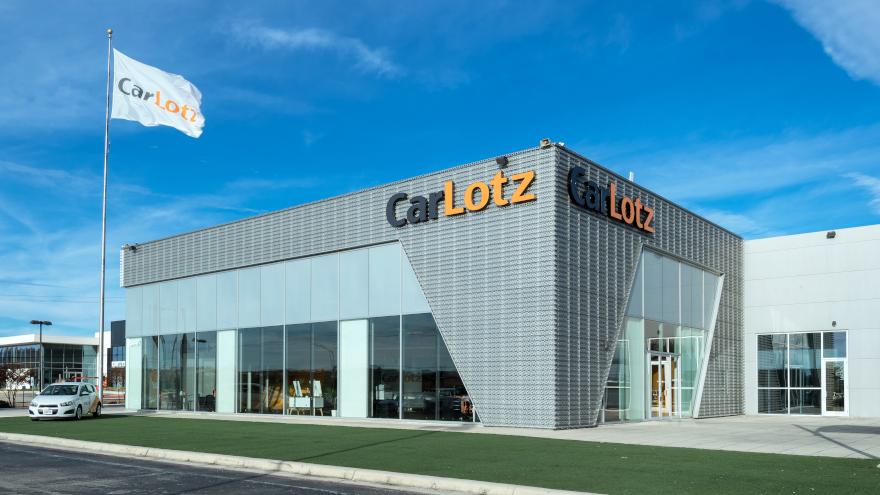COMMENTARY: A new dawn emerges — Retail remarketing in the time of COVID-19

The CarLotz location in San Antonio. Photo courtesy of company.
By subscribing, you agree to receive communications from Auto Remarketing and our partners in accordance with our Privacy Policy. We may share your information with select partners and sponsors who may contact you about their products and services. You may unsubscribe at any time.
RICHMOND, Va. –
It’s a new day — we’re seeing the other side of this pandemic and gaining additional clarity on the future. It’s been an unusual, stressful, and frightening few months as we’ve all navigated our personal andrbusiness lives in the wake of COVID-19.
While companies throughout our industry have been forced to modify basic business practices, dramatically reduce headcount, fortify balance sheets, and adjust to the most abrupt business interruption we’ve ever seen, many of us have had to take a step back and try to figure out what this new landscape means for our clients and how we can adapt to ensure that we continue to meet client needs with necessary value.
The changes we’ve seen in the industry have impacted all segments of the supply chain.
From OEMs that shut down plants, to rental car companies that saw a 90% drop in demand and, as a result, bankruptcy, to auctions that have had to shift to online-only sales, to fleet management companies that are trying to turn their clients’ vehicles into cash without giving them away, to retailers that have been forced to shift quickly to online sales only or shut down altogether.
The data suggests that sale rates at the auction dipped into the 30% range and have been rebounding, while pricing took a 15%-20% decline. On the retail side, we saw about a month of year-over-year sales declines of up to 75%, but the retail sales pace quickly rebounded to pre-COVID levels by mid-May.
From a pricing perspective, retail oddly didn’t see a dip in pricing of more than 2-3% which led to a significant disparity between wholesale and retail returns that many dealers and consigners who remarket at retail took advantage of. While we typically see net retail checks to our clients that are about $1,000 over their expected wholesale net proceeds, during the depths of COVID we were seeing lifts of over $3,000 to $5,000! The market has certainly converged over time, but the retail lift over wholesale remains significant.
Subscribe to Auto Remarketing to stay informed and stay ahead.
By subscribing, you agree to receive communications from Auto Remarketing and our partners in accordance with our Privacy Policy. We may share your information with select partners and sponsors who may contact you about their products and services. You may unsubscribe at any time.
So how has retail remarketing adjusted to this new post-COVID world? It’s safe to say that auto retailers fall into two categories: 1) those that deserve the “used-car salesman” stereotype and 2) those that don’t.
In the post-COVID world, it’s going to be harder and harder to survive as an old-school, giant inflatable gorilla on the roof used-car dealership but it’s actually going to be easier and easier to differentiate yourself as a forward-thinking, customer-centric, used-car retailer, as the bar has been raised by consumers.
Do you maintain a clean and safe environment for your guests and teammates? Do you do business in a manner desired by the car-buyer — either online, in-store, or a hybrid?
Do you offer the assurance that the vehicle is in good shape and do you do something about it if it turns out its not? Do you take advantage of technology to ensure that buyers feel comfortable buying a car sight unseen?
If you’re a retailer of used vehicles and you answered no to any of the questions above, you’re destined to be Blockbuster versus Netflix. These are no longer unique differentiating features of a dealership, they are a requirement to do business.
So the new world of retail is touch-free, online AND in-store, paperless, and quick while offering the buyer the comfort that if they bought a bad apple, you’ll figure out a way to make it a good apple or you’ll give them a better apple.
If you do all of that and you can wrap it with in-demand inventory at fair prices, you will do well. We’ve adopted all of these policies and procedures and, as a result, less than two months after we were virtually shut down, we are selling more cars than we did this time last year.
Our clients, the big national consignors, fleet management companies, banks and financial institutions, rental-car companies, and others, are getting their cars sold more quickly at great prices and historic lift over wholesale values. We anticipate that as the flood of inventory that has bogged down the physical auctions works its way through the supply chain, the elevated lift of retail over wholesale will last for many months to come.
Michael Bor is chief executive officer of CarLotz


